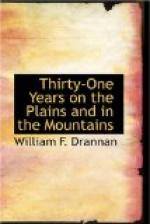Here we laid over three days to let our horses rest up a little. While here we had all the fish that we wanted to eat, for the lake was literally full of the finest in the land.
In a southwesterly direction we could see, by looking through our field glasses, a large valley, which Col. Elliott thought to be the country which he was ordered to go to.
The second day after leaving Clear Lake we struck another lake. We did not name it, but it has since been known as Tule Lake, and is the outlet of Lost river, but has no visible outlet itself. Here we laid over two days, after which we pulled out up the valley. Two days more and we were at Klamath Lake, and here Col. Elliott established his headquarters and started in to fortify himself against the Indians, which were very numerous in this country at that time.
John Riley, Fred Miller, John Boyd, George Jones and myself took four days’ rations and started out to investigate the surrounding country north of headquarters.
The next afternoon about three o’clock we saw a band of Indians some distance away as they were passing over a somewhat uneven country. We were not just able to tell the number in the band, but thought there must be about twenty, and they were driving some loose horses.
We stopped to consider the matter as to what was best to be done. George Jones said: “Boys, we have been out all summer and have not got a single horse to pay for our trouble, and I think I could fight like the devil if there was a good band of horses at stake.” The balance of the crowd seemed to think likewise, so we concluded to follow up the Indians and give them a round. We started at once, but before overtaking them they had pitched camp on the shore of Lake Klamath.
After it was quite dark, George Jones and I crawled around near the camp and counted twenty Indians.
Our intention had been to stampede the horses in stead of making an attack on the Indians, as we thought the number too great to tackle, but an investigation developed the fact that they had turned their horses into a little peninsula that ran out into the lake, and had pitched their tents so as to hold their horses in there. Riley said there was only one of two things to do, and that was to make the attack or crawfish. We were all well armed, the other four having each a six-shooter and a sabre, and I had my big knife, which was almost as good as a sabre, and two six-shooters.
We laid and watched their movements until all turned in for the night.
They were badly scattered, making it worse for us than if they had been in a bunch. We waited until about eleven o’clock, when we thought they were all asleep, and having laid our plans of attack, we all crawled up abreast to within a rod or so of where some of them were lying, and each drew his pistol and sabre.
Taking our pistols in our left hands and sabres in the right, we made a rush for them, intending to cut the first ones down with our sabres, and if we got into close quarters we could use both at the same time.




